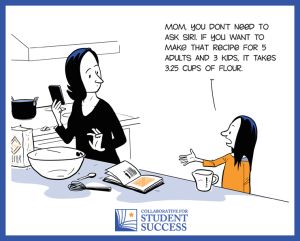Eighth Grade Math IS Changing – But Students Won’t Learn Any Less

 Math is changing, but now how you might think. In the Los Angeles Times, Sonali Kohli makes note of the changes coming to eighth grade math classrooms. She writes, “instead of emphasizing Algebra I where only some students thrive, many schools are placing all students in the same general class that covers several concepts.” However, these changes don’t mean that students will be learning any less.
Math is changing, but now how you might think. In the Los Angeles Times, Sonali Kohli makes note of the changes coming to eighth grade math classrooms. She writes, “instead of emphasizing Algebra I where only some students thrive, many schools are placing all students in the same general class that covers several concepts.” However, these changes don’t mean that students will be learning any less.
Instead of emphasizing Algebra I in middle school, Common Core State Standards call for students to participate in “general” math classes, which cover concepts of algebra, geometry and statistics and challenge students just as Algebra I did. But no matter what the class is called, students will be learning the material that will prepare them for success in advanced math classes in high school and beyond.
The article suggests that this progression could preclude more of California’s students from reaching high levels of math, like Algebra II, which is a requirement for students to qualify for University of California or Cal State University admission. In reality, it’s just the opposite. If fewer 8th graders are taking advanced math in 8th grade, it doesn’t mean fewer students are going to be ready for advanced math in high school. Under Common Core, more students will be better prepared and ready to tackle the more advanced math classes.
Bottom line: 8th grade math is now much more rigorous than it was. Students are taught algebra, geometry and statistics content, so there is less of a need to push 8th graders into an advanced class.
In fact, Kohli also notes that this new class style may have real benefits for students of color: “Having more students taking a single, general eighth grade math course might help solve a different problem: the segregation that happens inside schools and between classrooms, when black and Latino students are kept out of high-level classes.”
What’s important is that students are being prepared for advanced math in high school and beyond – not what the class is called. Some have claimed that Algebra causes students to drop out, while others blame the Common Core for a decrease in the numbers of students taking Algebra. The reality is that the Common Core solves both problems. Now more students are being prepared to more rigorous math content, and fewer students are being pushed into an advanced math class they are not yet prepared to tackle.
Blair Mann is the Director of Media Relations at the Collaborative for Student Success
About the Collaborative for Student Success
At our core, we believe leaders at all levels have a role to play in ensuring success for K-12 students. From ensuring schools and teachers are equipped with the best materials to spotlighting the innovative and bold ways federal recovery dollars are being used to drive needed changes, the Collaborative for Student Success aims to inform and amplify policies making a difference for students and families.
To recover from the most disruptive event in the history of American public schools, states and districts are leveraging unprecedented resources to make sure classrooms are safe for learning, providing students and teachers with the high-quality instructional materials they deserve, and are rethinking how best to measure learning so supports are targeted where they’re needed most.

